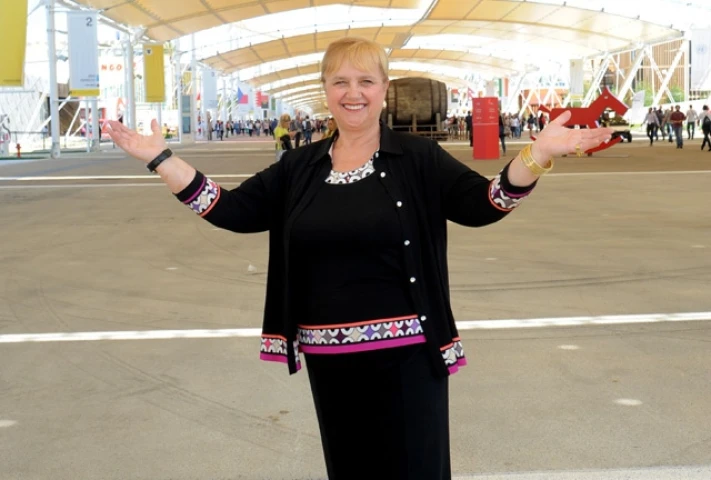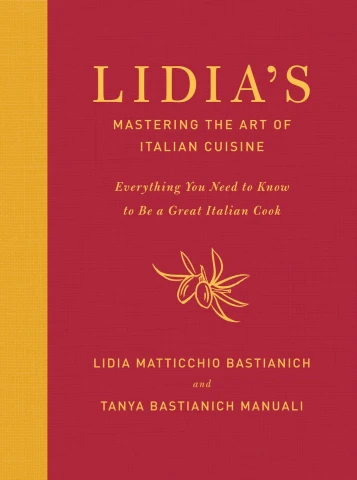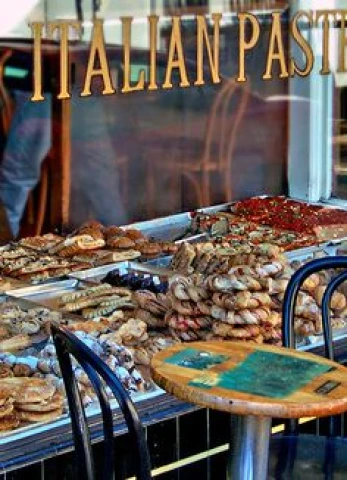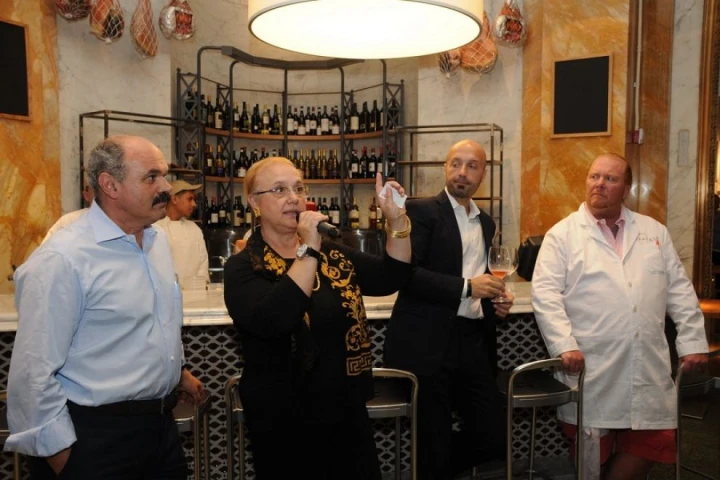We rarely have true celebrities, admired and well known both in Italy and the US, in this column. We have met more than a hundred wonderful persons during this trip, from all of whom I learned a lot about so many interesting topics: people successful, dedicated, but today a true celebrity is with us. Still, she has welcomed us with the simplicity and the kindness of a true Italian woman: but make no mistake, she's the number one Italian chef in the US.
Lidia Bastianich is a story of success, talent, hard work: in a word, a story of Italianità. We are so glad to have the opportunity to meet her and ask her a few questions: we admire her, we love her cuisine, we are her number one fan. Go Lidia! And thank you very much for being as you are
Lidia, is it true that you owe your passion for cooking to your grandma? Millions of Italian American women will probably recognize themselves in this story ...
It is true; my grandmother was a huge influence on me. I was raised in a post war situation and, while we felt 100% ethnically Italian, we couldn't speak Italian and we couldn't go to church. My mother, who was a teacher, placed me and my brother with my grandmother in a town outside the big city. There I could speak Italian and my grandmother would take me to church regularly. She grew and raised everything we ate, so we had chickens, rabbits, goats and pigs. We made olive oil and wine; we dried peas and beans for the winter. I kept very much involved in food, growing it, tasting it, and always helping. When my parents decided we needed to leave, hopefully for a better life, they didn't tell me or my brother that we were going to the other side of the world. So I was abruptly removed from that heaven, it was... unexpected, and I think that my passion for food remained – and still is – my connection with my roots and to my grandmother.
When I want to remember my grandmother, I cook the dishes she did. I have always had this link back to my roots, and those roots are simplistic, from the ground. You can't get any better than that.
In July 2015 you've been to the US pavillion of Expo 2015 in Milan, which core theme was "Feeding the Planet, Energy for Life". What do you think about that experience?
I did two events at the Expo. I think that the intended message is really valiant. As a world today we need to really get united to discuss and address the issues and the problems, so we are able to feed the planet, able to give food to all.
I was also part of "WE-Women for Expo" and I was on one of the panels that discussed such important topics like women of the third world cooking over fire. These women ask their daughters to collect the wood for fire rather than send them to school. It diminishes the role of women. Plus, there is the additional problem of carbon emissions in the atmosphere. This seems like such a small thing, but it really is a cultural switch, and it is difficult. Did we find a solution? No, but we talked about it and there were proposals, for me it was interesting.
Your new book is a compendium of Italian cuisine, "Mastering the Art of Italian Cuisine": more than 400 pages of tips, recipes and everything you need to know to be a great Italian chef. Please tell us something more about it
This book is about how Italians really cook. Cooking is about products, not about people. If you have the right products, and for me those are the Italian products, cooking is much better and easy. In this book I explain many techniques. For instance, if you know the technique of risotto you can make the risotto with mushrooms, or with lobster, or in several other ways. I also focus on handling the raw products, how to clean them, how to store them.
My daughter, Tanya Bastianich Manuali, is my coauthor. She does quite a bit of the research and writing. We both loved the idea of a glossary. It is important to understand Italian words and use the right references to Italian products. The glossary is intertwined with my philosophy: in the end, food connects people. We all have this single common denominator. Cooking for someone, for me, means to enter into their life, into their soul. Food is social; it is communication, much more than the technology that today is given such a high priority. And you don't have to have a big complicated meal for that, even with the simplest things you put on the table - you connect with people.
Before opening your first restaurant, you worked in different pastry shops. Now, when we talk about Italian food in the US, of course restaurants are the first to be mentioned. But there are also thousands of Italian bakeries and pastry shops, all over the US. They too are true Ambassadors of the Italian excellence for cooking and food, am I right?
When I started working I was only fourteen and I started in a pastry shop in Astoria. It was a German pastry shop, Christopher Walken's family pastry shop. I started there and when I went to the university I began working in restaurants and from then on I was always cooking or baking something. It was always all about food.
Pastry shops are particularly significant for the remembering of traditions, because you cook everyday, but sweets and desserts are for special occasions. In Italy, every saint has a special dessert, then there's Christmas, Easter, it's all about the pastry. The Italian typical pastry shop was extremely important in the Italian American community, because it was where they could really celebrate the special occasions, the special festivities.
You've been the first to say loud and clear that Italian American cuisine and Italian cuisine are two different things. You had the intelligence of doing it with great respect for the Italian American cuisine, and that's probably why it brought to a smooth acceptance of this fundamental diversification. Do you think it's possible to do the same with the Italian sounding products made in America?
I think it is. I think that Italian products made in America came out of almost a necessity, a response to a need that wasn't fulfilled by Italy. I specifically remember because I opened my first restaurant in 1971 and I could not find Grana Padano, Parmigiano Reggiano, Aceto Balsamico. If you don't have all the Italian ingredients is hard to say that you have a true Italian restaurant, because the Italian cuisine is based on its traditional Italian products. I think the way Italians should approach this is by being positive, not negative against the Italians sounding products because the Americans are open, waiting to taste all that is good and beautifully Italian. Italy needs to invest in promoting, in teaching, in tasting, in spreading the good Italian products. The Americans are intelligent enough to educate themselves: if you give them a good piece of Grana Padano or Parmigiano, they will know the difference between that which is authentic and that which is not. Maybe they won't know that immediately, but that's why we have to educate them. You have to invest in positive communication.
When you're cooking, what's your favorite dish? And what about when you're the one eating?
There is a difference, but basically I love eating and I love offering in the restaurants what's in season, the products that are the best. I love cooking vegetables, and pasta: spaghetti or linguine with vongole, you can't beat that, it's one of my favorites. If you don't have the vongole or the clams, I am also ok with spaghetti aglio olio e peperoncino. Fantastico! So simple, straightforward, good oil, good pasta, and so focused on traditional ingredients.
You are part of the team that gave birth to the huge success of Eataly in New York. Now there's an Eataly in Chicago and Boston, too. Are you planning to open Eataly in other American cities?
We are. We are working on a second unit here in New York at the World Trade Center, we are planning to open in Los Angeles. I think there is an acceptance for this kind of business. We did open last year in Sao Paulo, Brazil, we are talking about Toronto. We are expanding ... we have a lot of plans. Because we feel like we are carrying a message, we open the door, so all those traditional products can come. I think that what works here is the fact that with Mario Batali, my son Joe, myself, we cover a big territory.
What would you suggest to a young Italian chef who has the dream to open a restaurant in the US?
First of all, know your heart, your passion. Then you have to learn the market here. You have to come here and work a bit before, understand the American mentality. Then we're talking about food, so there's the passion for this profession, but you're still talking about a business. You need some marketing, you need to know the actual financials of running a restaurant. If you go to a big city, there are big expenses. One month, two months, three months, and if you do not succeed it's the end of that. Some started by bringing the Italian flavor and collaborating with someone that already is in this business. In America there are always opportunities for someone that is good, dedicated and hard-working, and understands business.
What do you think will be the future of the Italian cuisine in the US?
I think it has a great future. You know, every Italian region has fantastic products, flavors, and recipes. I think that the Italian cuisine is really going to permeate in a big way the American way of cooking. I see young chefs as I go around in American restaurants, and the restaurants may be American or other ethnicity: but when I look in the menu, inevitably I see Italian products.
To do Italian cuisine, you have to be a specialist in the regional cuisine; but to use Italian products, you can be a good chef, whatever is your ethnicity or your cuisine. So there's a tremendous growing opportunity for the Italian products to pervade the actual American table.
Raramente intervistiamo vere e proprie celebrità, ammirate e conosciuti sia in Italia che negli Stati Uniti, in questa rubrica. Abbiamo incontrato più di cento persone meravigliose durante questo viaggio, da ognuno dei quali ho imparato molto su molti argomenti interessanti: persone di successo, appassionate, ma oggi è con noi una vera celebrità. Eppure, lei ci ha accolto con la semplicità e la gentilezza di una vera donna italiana: ma ciò nonostante, lei è la chef italiana numero uno negli Stati Uniti.
Lidia Bastianich è una storia di successo, di talento, di duro lavoro: in una parola, una storia di italianità. Siamo molto felici di avere l'opportunità di incontrarla e farle alcune domande: la ammiriamo, amiamo la sua cucina, siamo i suoi primi fans. Go Lidia! E grazie molto per essere come sei
Lidia, è vero che devi la tua passione per la cucina a tua nonna? Milioni di donne italoamericane probabilmente si riconoscono in questa storia ...
E' vero, mia nonna ha avuto una grande influenza su di me. Sono cresciuta in una situazione post guerra e, nonostante ci sentissimo al 100% italiani, non potevamo parlare la nostra lingua né andare in chiesa. Mia madre, che era un insegnante, aveva spedito me e mio fratello dalla nonna in una città fuori dai grandi centri urbani. Lì potevo parlare italiano e mia nonna mi portava regolarmente in chiesa. Mangiavamo quello che coltivavamo e allevavamo noi: avevamo polli, conigli, capre e maiali. Facevamo l'olio e il vino; pulivamo piselli e fagioli per l'inverno. Il cibo era in tutto quello che facevo: lo coltivavo, lo gustavo, aiutavo a cucinarlo. Quando i miei genitori decisero che dovevamo partire, sperando in una vita migliore, non dissero a me e a mio fratello che stavamo andando dall'altra parte del mondo. Così mi è stato bruscamente tolto qual paradiso, in maniera... inaspettata, e penso che la mia passione per il cibo sia dovuat al fatto che c'erta - e c'è ancora – un legame con le mie radici e con mia nonna.
Quando voglio ricordarla, cucino i piatti che faceva lei. Ho sempre avuto questa volontà di tornare alle mie radici, alla loro semplicità, la semplicità della terrà. Non c'è niente di meglio.
Nel luglio 2015 sei stata al padiglione degli Stati Uniti di Expo 2015 a Milano, il cui tema era "Nutrire il Pianeta, Energia per la Vita". Cosa ne pensi di questa esperienza?
Ho partecipato a due eventi, a Expo. Penso che il tema scelto sia stato davvero coraggioso. Oggi abbiamo bisogno di discutere e affrontare tutti uniti le questioni e i problemi per poter continuare ad alimentare il pianeta, in grado di dare da mangiare a tutti.
Sono stata anche parte di "WE-Women for Expo" e abbiamo discusso di un tema molto importante, quello delle donne del terzo mondo, e di come cucinano sul fuoco i loro alimenti. Queste donne chiedono alle loro figlie di raccogliere la legna per il fuoco, invece che mandarle a scuola. E' una diminuzione del ruolo delle donne. Inoltre, c'è l'ulteriore problema delle emissioni di carbonio nell'atmosfera. Questa può sembrare una piccola cosa, ma in realtà è un cambio culturale, necessario ma difficile. Abbiamo trovato una soluzione? No, ma abbiamo discusso e analizzato proposte, per me è stato interessante.
Il tuo nuovo libro è un compendio della cucina italiana, "Mastering the Art of Italian Cuisine": più di 400 pagine di consigli, ricette e tutto ciò che serve sapere per essere un grande chef italiano ...
Questo libro parla di come gli italiani cucinano nella realtà. La cucina riguarda i prodotti, non le persone. Se si hanno i prodotti giusti, e per me quelli giusti sono i prodotti italiani, la cucina è molto migliore e più facile. In questo libro spiego diverse tecniche. Ad esempio, se si conosce la tecnica per cucinare il risotto si può fare il risotto ai funghi, o con gli scampi, o in molti altri modi. Mi concentro anche sulla gestione dei prodotti grezzi, come pulirli, come conservarli.
Mia figlia, Tanya Bastianich Manuali, è la coautrice del libro. Lei ha fatto ricerca e ne ha scritto una parte. Entrambe abbiamo condiviso l'idea di un glossario: è importante capire le parole italiane e utilizzare i riferimenti giusti per i prodotti italiani. Il glossario si intreccia con la mia filosofia: alla fine, il cibo unisce le persone. Tutti noi abbiamo questo unico comune denominatore. Cucinare per qualcuno, per me, significa entrare nella loro vita, nella loro anima. Il cibo è sociale: è comunicazione, molto più che la tecnologia che oggi viene data come una priorità. E non c'è bisogno di avere un grande pasto complicato, anche se si mettono sul tavolo le cose più semplici ci si connette con le persone.
Prima di aprire il tuo primo ristorante, hai lavorato in pasticceria. Ora, quando si parla di cibo italiano negli Stati Uniti, i ristoranti sono ovviamente la prima cosa che viene in mente. Ma ci sono anche migliaia di panetterie e pasticcerie italiane, in tutti gli Stati. Anche loro sono veri ambasciatori dell'eccellenza italiana per la cucina e il cibo, giusto?
Quando ho iniziato a lavorare avevo solo quattordici anni e ho iniziato in una pasticceria di Astoria, nel Queens. Era una pasticceria tedesca, di proprietà della famiglia dell'attore Christopher Walken. Ho iniziato lì e quando sono andata all'università ho iniziato a lavorare nei ristoranti e da allora non ho mai smesso di cucinare.
Le pasticcerie sono particolarmente significative per il ricordo delle tradizioni: perché si cucina tutti i giorni, ma dolci e dessert sono per le occasioni speciali. In Italia, ogni santo ha un suo dessert speciale dedicato, poi c'è il Natale, la Pasqua, e c'è sempre una ricetta diversa. La pasticceria tipica italiana è stata estremamente importante per la comunità italoamericana, perché segnava e segna la celebrazione di occasioni speciali.
Sei stata la prima a dire forte e chiaro che la cucina italoamericana e la cucina italiana sono due cose diverse. Hai avuto l'intelligenza di farlo con grande rispetto per la cucina italoamericana, e questo è probabilmente il motivo che ha portato tutti ad accettare serenamente questa fondamentale dichiarazione. Pensi che sia possibile fare la stessa cosa con i prodotti Italian sounding realizzati in America?
Penso di sì. Penso che i prodotti simil italiani realizzati in America sono stati realizzati quasi per necessità, una risposta ad un bisogno che non veniva soddisfatto dall'Italia. Quando aprii il mio primo ristorante nel 1971, non riuscivo a trovare il Grana Padano, il Parmigiano Reggiano, l'Aceto Balsamico. Se non hai tutti gli ingredienti italiani è difficile sostenere che il tuo sia un ristorante italiano: perché la cucina italiana si basa sui suoi prodotti tradizionali. Penso che il modo in cui oggi l'Italia dovrebbe affrontare questo problema è di non essere negativi contro i prodotti simil italiani: perché gli americani sono aperti, amano gustare tutto ciò che è buono e italiano. L'Italia ha bisogno di investire nella promozione, nella didattica, nella degustazione, nella diffusione dei buoni prodotti italiani. Gli americani sono abbastanza intelligenti per imparare: se si dà loro un buon pezzo di Grana Padano o Parmigiano, sapranno capire la differenza tra ciò che è autentico e ciò che non lo è. Forse non lo comprenderanno immediatamente, ma è per questo che dobbiamo educarli. Bisogna investire in comunicazione positiva.
Qual è il piatto che preferisci cucinare? E quale quello che preferisci mangiare?
Di base mi piace mangiare e mi piace che nei mie ristoranti si offrano piatti basati sui prodotti di stagione. Amo cucinare le verdure e la pasta: spaghetti o linguine con le vongole, non c'è niente di meglio, è uno dei miei piatti preferiti. Se non si hanno le vongole, vanno bene anche spaghetti aglio olio e peperoncino. Fantastico! Così semplice, facile: del buon olio, pasta italiana, tutti ingredienti tradizionali.
Tu sei parte della squadra che ha dato alla luce al grande successo di Eataly a New York. Ora c'è anche un Eataly a Chicago e uno a Boston. Avete in programma di aprire Eataly in altre città americane?
Sì. Stiamo lavorando su una seconda location qui a New York, presso il World Trade Center; e stiamo progettando di aprire a Los Angeles. Penso che questo tipo di attività abbia un buon successo. Abbiamo aperto l'anno scorso a San Paolo, in Brasile, stiamo parlando con Toronto. Ci stiamo espandendo ... abbiamo molti progetti. Perché sentiamo che stiamo portando un messaggio, noi apriamo la porta, in modo che tutti i prodotti tradizionali possano venire. Penso che ciò che funziona è il fatto che insieme con Mario Batali, con mio figlio Joe e con me, compriamo un grande territorio.
Cosa consiglieresti a un giovane chef italiano che ha il sogno di aprire un ristorante negli Stati Uniti?
Prima di tutto, conoscere il proprio cuore, la propria passione. Poi devi imparare il mercato americano. Devi venire qui e lavorare un po', prima: capire la mentalità americana. Poi stiamo parlando di cibo, quindi serve la passione per questa professione; ma è anche un business. E' necessario sapere di marketing, conoscere i dati finanziari relativi alla gestione di un ristorante in America. Se si va in una grande città, ci sono grandi spese. Se in tre mesi non si decolla, è la fine. Alcuni iniziano portando i sapori italiani e collaborando con qualcuno che è già in questo business. In America ci sono sempre opportunità per qualcuno che è bravo, competente e appassionato, e capisce di business.
Quale pensi che sarà il futuro della cucina italiana negli Stati Uniti?
Penso che abbia un grande futuro. Ogni regione italiana ha fantastici prodotti, sapori e ricette. Penso che la cucina italiana è ormai entrata definitivamente nel modo di cucinare americano. Vado in giro nei ristoranti americani e vedo giovani chef, che lavorano in ristoranti di qualsiasi etnia: ma quando guardo il menu, inevitabilmente vedo qualche prodotto italiano.
Per proporre la cucina italiana, devi essere uno specialista della cucina regionale; ma per usare in cucina prodotti italiani, basta essere un buon cuoco, qualunque sia la tua provenienza o lo stile etnico del tuo ristorante. Quindi c'è una straordinaria opportunità di crescita per i prodotti italiani, che entreranno sempre di più nelle case di tutti gli americani.







